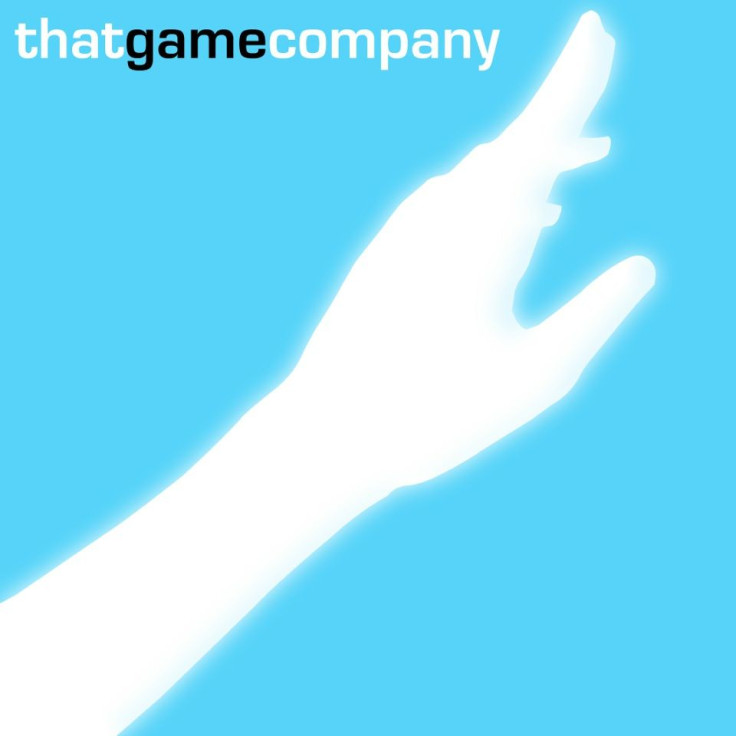The Emotional Experience Of Video Games: 'Journey' Creator Talks Developing Games That Move Players

When Jenova Chen founded thatgamecompany in 2006, he wasn’t trying to create the next Bungie or Activision. Instead, the now 33-year-old game designer, who was then 25, wanted to find a way to create emotional connections with players through video games.
Chen, who was born in Shanghai and moved to the United States in 2003, met with International Business Times in the lobby of a modern West Village hotel last week, hours before he was to deliver the closing keynote speech at the 2014 Games For Change Festival, a division of the Tribeca Film Festival.
Chen, who was running on mere hours of sleep after a redeye flight from the West Coast, spoke candidly about the first time he was genuinely moved by a video game experience -- while playing RPG “The Legend of Sword and Fairy,“ which reached China in 1996. It was a transformative experience.
“In many ways, the story is very similar to ‘Final Fantasy VII,’” Chen told IB Times. “You spend a lot of time with this female lead, somewhere in the middle of the story, she dies, and it’s a typical Romeo and Juliet story. The execution was good enough, where as a teenager, I’d never been exposed to this type of tragic loss, it was really my first time experiencing it. The game made me cry. That game was so good, this whole generation of Chinese players all remember growing up and crying to this game.”
Chen also discussed what happens when a generation of young gamers grows up – and the challenge of appealing to an entirely new demographic of players.
“A lot of people I know who used to play games, went to college and stopped…I was able to play a lot more than my friends who got busy with work and family, they don’t have that luxury anymore. But they still watch films. They still go to concerts, they still go to sports events, why do they put the game down?” Chen hopes thatgamecompany’s projects will appeal to everyone, though he feels that “older people generally prefer more complex and more nuanced emotion.”
“Most of the video games that appeal to the younger generation are very much typecast, primal direction, it’s all about big power, big guns, being fast, being cool. Lack of nuance,” Chen explained to IBTimes. “When we make games, we’re not just making an escape. We’re making something from real life into this fiction. With the abstraction and metaphors, the fiction actually feels more real. A great painter can paint something really complex but they can crystallize it into something really simple.”

Thatgamecompany is the independent video game studio behind 2006’s “Flow,” 2009’s “Flower” and 2012’s “Journey.” The developer is known for mapping out games according to what they want players to feel, rather than by establishing specific game mechanics. Still, “Journey,” which launched on March 13, 2012, has won numerous accolades. It won six awards at the Game Developers Conference in 2013, including Best Game Design, Best Audio and Game of the Year.
“My intention isn’t to make the game that’s going to generate the most revenue possible. I grew up with games. It changed my life. It changed my social relationships with my friends. It defined my childhood. It’s something I really cherished,” Chen said of the success of “Journey.”
"Seeing games become more of a young person thing, I feel like a toy I grew up with has been left behind. I don’t want to. I want this thing to be respected by adults. I want this thing to be growing with me. It’s important to have games that could be more nuanced and reflective of the real world and relevant to adults,” Chen said.
None of thatgamecompany’s projects possess any dialogue. Instead, they’re driven by compelling music and scenic graphics that allow players to create their own experience and interpretation of his company’s titles.
“Language is very deceiving. In certain languages, there is certain vocabulary that doesn’t exist in other languages. It totally changes how people feel about things,” he said. “Being a Chinese man working on games, particularly console gaming, in order to find something that would really resonate with people, I had to find something that was really primal, very universal. I drew a lot of inspiration from Pixar, how a film can be well-loved by all cultures. It’s because they always talk about the fundamental things – family, peace.” Chen’s favorite Pixar movie is 2004’s “The Incredibles,” a heart-warming film about a superhero family.
“When we’re working on games, I like the fact that there are no words, so we can focus on what is more primal. A lot of time when you don’t speak, the feeling is more pure.”
Though his studio has received positive attention and what most would consider commercial success, does Chen still consider thatgamecompany to be an indie brand?
“I was indie when we started eight years ago. But today, indie is very difficult. There are thousands of iPhone apps coming out every day. Most of these apps are made by individuals in their spare time. Are they indie? If they are, how are they different from us? It’s weird. Indie is not cool anymore,” Chen said. “But there’s something romantic and exciting about indie, trying something really new. My definition of indie is that it’s financially not proven. Basically, if someone makes ‘Flappy Bird,’ and it’s already proven to be financially successful, and someone makes a clone, is he indie? I don’t think so. You already know it will make money. It’s soulless. There’s no heart. It’s about the heart.”
Chen is adamant that financial success was never the company’s primary goal.
“With ‘Journey’ and ‘Flower’ we’ve never seen games like this in the past. We don’t know if it’s going to work. I believe they will work, because these emotions are needed in the industry. Even with our current project, it’s a pretty indie project. We’re trying something no one has done in the past. There’s a lot of risk involved, but it’s really exciting.”

Many people raved that “Journey,” a three-hour long endeavor for the PlayStation 3, was one of the best games in 2012.
“I didn’t expect ‘Journey’ to be game of the year, but I did expect ‘Journey’ to touch someone. We spent three years creating an emotional impact. That’s what we really want to see in people,” Chen told us. “We didn’t foresee the impact the game would have, when you actually really move someone. People have told us that ‘Journey’ is the best near-death simulation, because they’ve had near-death experiences. A guy who was clinically dead for 15 minutes and brought back said the final level of the game was the closest thing to his actual near-death experience.”
“I’ve had people send emails to me, saying they’ve lost their grandparents or father or dearest friends. A lot of them were having trouble putting their losses into terms. Then when they played the ‘Journey’ online player, they felt like they were being guided by their loved ones, and somehow they found a way to say goodbye. I didn’t know the game could have such a therapeutic effect.”
Chen’s company is currently working hard on a secret project he can’t discuss, though he feels it will be different from what’s currently available in the gaming realm.
“Now we have 2 billion mobile devices. We have 2 billion people playing games, and they’re not playing complex games, they’re playing like ‘Candy Crush’ and ‘Angry Birds.’ If you look at the numbers, the mainstream has already shifted. The mainstream emotion needs to change.”
Chen’s closing speech, which took place on April 24 during the Games For Change closing ceremony, discussed the process of designing a new era of emotional storytelling through games.
© Copyright IBTimes 2024. All rights reserved.




















